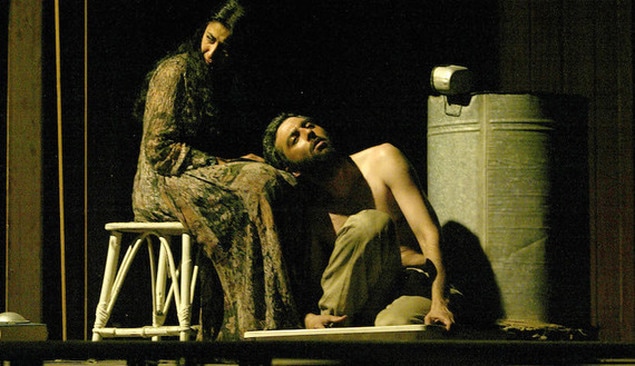Hussein and his friends succeeded in renovating and reopening one floor of the theater on time to produce artistic and theatrical pieces and perform them on stage.
While watching a musical performance that night, prominent young stage director and actor Alaa Qahtan told Al-Monitor, “Our dream has finally come true. Al-Rashid Theater has come back to life and we can now perform our plays in it.” A concert, poetry readings and a theatrical performance were held to mark the opening night. Rain poured from the ceiling over the heads of spectators and actors alike. Qahtan told Al-Monitor, “The theater was not properly and professionally renovated, and it requires more efforts and money.”
Al-Rashid Theater, built in 1984, fell victim to the successive Iraqi governments’ negligence of cultural infrastructure after 2003. The theater was shelled during the invasion of Baghdad in April 2003, and the building was left in ruins. When local artists could wait no longer for government support, they decided to renovate it privately.
Hussein told Al-Monitor, “Intellectuals responded to the idea of renovating the theater and everybody was willing to embrace it.”
On March 17, one month after the signatures were collected, Iraqi youths and artists volunteered to haul out the rubble and clean the premises. Hussein noted that they have been able to clear only one floor out of nine for use. He said, “Around $9,000 was collected from intellectuals and Iraqi parliamentarians to renovate the theater. We also received qualitative aid such as lighting and sound installations.”
Hussein spoke to Al-Monitor in the center of Baghdad, where he was urging young cinematographers to screen their movies in the theater.
Hussein said he wished the theater “would keep showing artistic works daily, as it has a deep-seated history and has shown global performances in the past, like the German Ruhr theatrical troupe in the 1980s.”
Ahmad Moussa, a stage director and volunteer, said that he is scheduling meetings with telecommunications firms like Zain Company to collect donations for the lighting and sound systems and the central air conditioning. He told Al-Monitor, “The Ministry of Culture and government are complaining about their inability to pay to renovate the theater. We must find donors and solutions to complete the job.”
Moussa listed huge challenges facing the volunteers, saying, “We wanted to renovate the theater’s floor, but the other nine floors need huge amounts of money, which we cannot collect from donations.” He does not have an estimate of the funds needed for the total restoration of the theater’s nine floors, but noted that what has been collected from donors is far from enough.
Moussa complained about “the bureaucratic manner that the Iraqi government and Ministry of Culture specifically adopt while dealing with the volunteers to renovate the theater," explaining, “We proposed to the Ministry of Culture to rebuild the theater through the ticket proceeds of artistic performances that will be shown on stage. But the ministry refused.”
He added, “This refusal stems from the bureaucratic system, which channels all theatrical proceeds to the Ministry of Finance, and then to the account of the Ministry of Culture.”
Moussa went on sadly, “This bureaucracy will never help rebuild the theater because it is a complicated network of governmental financial transactions.”
Qahtan doubts that the government’s failure to renovate the theater was due to its lack of funding. He said, “Perhaps Caliph Harun al-Rashid, who ruled during the Abbasid era and toppled Shiite imams, is a reason behind not renovating the eponymous theater.” Shiite parties prevail over the Iraqi government.
Still, the artists’ initiative is a positive sign of a new tendency in Iraq’s social and cultural circles: to free oneself from reliance on the government and its bureaucracy that delay development and neglect cultural matters like the theater.


 RSS Feed
RSS Feed